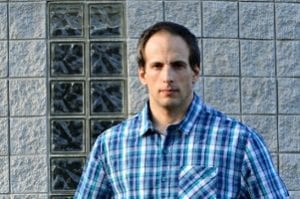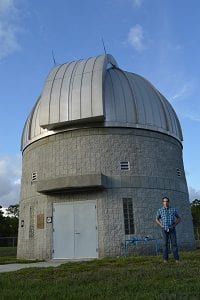Leos Pohl, a second-year doctoral student in UCF’s Planetary Sciences Group, will join two dozen other students at the observatory’s headquarters in Castel Gandolfo, a resort community just southeast of Rome.
“It’s one of the best opportunities in the world to get an introduction to planetary science,” said UCF physics professor Dan Britt, Ph.D., Pohl’s graduate advisor. “They get the very best experts in the world to teach it, and they select no more than two people from any one country. Just getting selected is quite an honor because it is hugely selective.”
During the month-long summer school that starts in late May, students from more than 20 nations will focus on the role of water in our solar system and cosmochemistry. Leading experts in astrophysics will direct lectures, presentations and hands-on projects, and students will present their own research.
It meshes well with Pohl’s research focus: asteroids, which experts theorize carried water to Earth. Even so, Pohl wasn’t sure he would be picked for the selective summer camp.
“I had no idea,” Pohl said. “With the specialization of water, I thought there might be many more students who were better-suited. It’s like fishing. You throw your bait in the water and you wait, and you don’t know if you’ll catch a fish.”
Pohl, who grew up in the village of Krinice in Czech Republic, earned a bachelor’s degree in physics and a master’s degree in theoretical physics from Charles University in Prague. He came to UCF last year, the culmination of a search for universities in the United States that have quality planetary science programs.
The Vatican Observatory is headquartered at the papal villa, within the papal gardens in Castel Gandolfo. It traces its origins to an observational tower erected inside the Vatican by Pope Gregory XIII in 1578. It was formally established inside the walls of Vatican City by Pope Leo XIII in 1891, but moved to Castel Gandolfo in 1935 to escape Rome’s nighttime light pollution.
Robert Macke, a Jesuit brother who earned his doctorate in physics from UCF in 2010, is curator of meteorites at the Vatican Observatory and dean of the summer school.
To read original story on UCF Today, click here.


